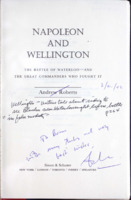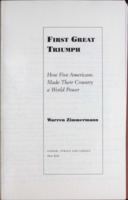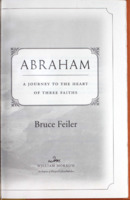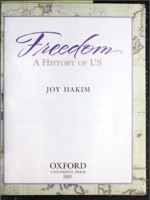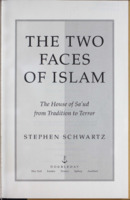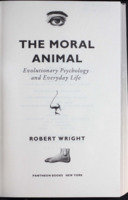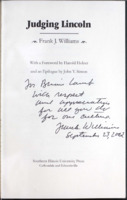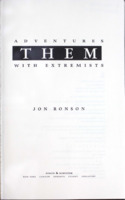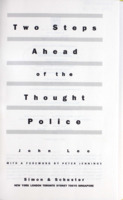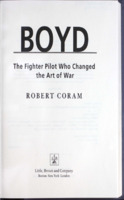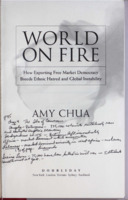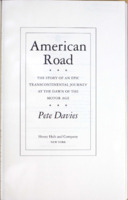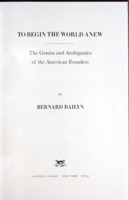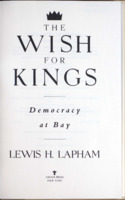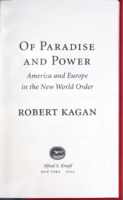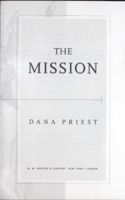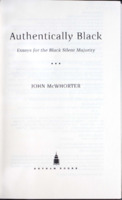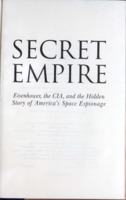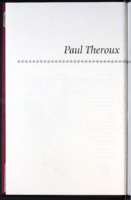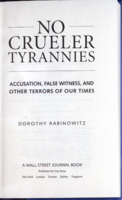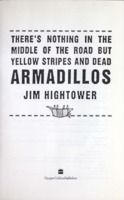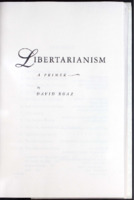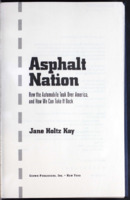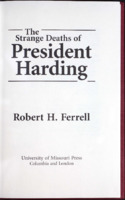Search
540 items
-
Napoleon and Wellington : the Battle of Waterloo and the great commanders who fought it
Explores the relationship between the French emperor Napoleon Bonaparte and the Duke of Wellington prior to and in the aftermath of the Battle of Waterloo, the most decisive battle of the nineteenth century. -
First great triumph : how five Americans made their country a world power
Documents how the United States rose to a significant world power one century ago through the actions of five political figures, including Theodore Roosevelt, naval strategist Alfred T. Mahan, and Senator Henry Cabot Lodge. -
Abraham : a journey to the heart of three faiths
In this timely, provocative, and uplifting journey, the bestselling author of "Walking the Bible" searches for the man at the heart of the world's three monotheistic religions--and today's deadliest conflicts. "Abraham" uncovers fascinating, little-known details of the man who defines faith for half of the world. Endpaper maps. -
Freedom : a history of US
The companion volume to a major 16-part PBS series brings the story of the United States as viewed through the inspiring fight to uphold the ideal of freedom--from the forging of the Declaration of Independence to the power behind the Civil Rights movement to the challenge the nation faces following the terrorist attacks of September 11. -
The two faces of Islam : the house of Saʻud from tradition to terror
In this informed, compelling exploration of Moslem beliefs and of the sectarian conflicts within the community, a Jewish historian paints a sympathetic portrait of mainstream Islam and exposes the centuries-old roots of Osama bin Laden's extremism. -
The moral animal : evolutionary psychology and everyday life
An accessible introduction to the science of evolutionary psychology and how it explains many aspects of human nature. Unlike many books on the topic, which focus on abstractions like kin selection, this book focuses on Darwinian explanations of why we are the way we are--emotionally and morally--and interweaves episodes from Darwin's own life as illuminating examples. Wright deals particularly well with explaining the reasons for the stereotypical dynamics of the three big "S's:" sex, siblings, and society. -
Judging Lincoln
Collection of nine essays on the topic of Lincoln compiled by Frank J. Williams, chief justice of the Rhode Island Supreme Court and one of the nation’s leading authorities on Abraham Lincoln. -
Paris 1919 : six months that changed the world
Between January and July 1919, after "the war to end all wars," men and women from around the world converged on Paris to shape the peace. Center stage was an American president, Woodrow Wilson, who with his Fourteen Points seemed to promise to so many people the fulfillment of their dreams. Stern, intransigent, impatient when it came to security concerns and idealistic in his dream of a League of Nations that would resolve all future conflict peacefully, Wilson is only one of the characters who fill the pages of this book. David Lloyd George, the British prime minister, brought Winston Churchill and John Maynard Keynes. Lawrence of Arabia joined the Arab delegation. Ho Chi Minh, a kitchen assistant at the Ritz, submitted a petition for an independent Vietnam. For six months, Paris was effectively the center of the world as the peacemakers carved up bankrupt empires and created new countries. This book brings to life the personalities, ideals, and prejudices of the men who shaped the settlement. They pushed Russia to the sidelines, alienated China, and dismissed the Arabs. They struggled with the problems of Kosovo, of the Kurds, and of a homeland for the Jews. The peacemakers, so it has been said, failed dismally; above all they failed to prevent another war. Margaret MacMillan argues that they have unfairly been made the scapegoats for the mistakes of those who came later. She refutes received ideas about the path from Versailles to World War II and debunks the widely accepted notion that reparations imposed on the Germans were in large part responsible for the Second World War. -
Them : adventures with extremists
In the tradition of Bill Bryson, a fascinating and frequently hilarious look at extremists around the globe, and the conspiracy theory that unites them. Journalist Jon Ronson, the mild-mannered but ironic observer, learns some alarming things about the looking-glass world of them and us. Are the extremists onto something? Or has Ronson become one of Them? -
Two steps ahead of the thought police
Two Steps Ahead of the Thought Police presents one of the liveliest, funniest, and most insightful commentators in America - John Leo. No one gets to the heart of a social issue more quickly, or with more sharpness and wit. Leo goes to an academic convention where teachers attack the "white maleness" of the game show Jeopardy, and he reveals a plaintive letter from SWAM (Straight White American Males) demanding their own minority parade. He adds up the total number of victims in America - 1.2 billion in a population of 251 million - and explains Leo's First Law of Racial Folly: All setbacks for integration will immediately be hailed as triumphs for diversity. Ranging widely over popular culture, law, education, politics, and language, Leo writes about Ozzie and Harriet, "bodice-ripping" novels, the sneaky side of the sneaker business, Republican buzzwords, and the dizzying effect of an average Mario Cuomo phone call.When Mattel brings out the first talking Barbie in twenty years, Leo gets an exclusive interview with her. He discusses Indians in their pre-Kevin Costner period, analyzes the strange sexual hostility in Newport cigarette ads, and explains why the innocent-looking word "fair" functions like a grenade when lobbed into legislation. Here is Leo on:. The "seventy-five deadly isms" plaguing America: "Handing a woman a diet cola could be construed as sizeist, lookist, and sexist, and perhaps handist and laughist as well." The problem in hate-crime laws: "The legislation in effect divides America into two classes: those whose skulls can be cracked with a criminal penalty of, let us say, six months in jail, and those whose skulls are better protected and thus warrant nine months in jail. But if the skulls of all Americans are equally valuable, why not just give everyone nine months for cracking any cranium at all?" Journalism, the official language of journalists: "Suppose you wish to point out that Senator Forbush is a clod. Do you type, 'Forbush, the well-known incompetent'? Not at all. You simply write that the poor fellow's reputation is 'still dogged by doubts about his competence.' Or if you feel he should be indicted, depict him as 'haunted by allegations,' which, as a responsible and thorough reporter, you are obliged to dig up and embellish." For Leo loyalists or for readers just discovering him - but most of all for the beleaguered majority impatient with extremists of all stripes - Two Steps Ahead of the Thought Police will be a treasured source of unconventional wit and wisdom. -
Boyd : the fighter pilot who changed the art of war
John Boyd may be the most remarkable unsung hero in all of American military history. Some remember him as the greatest U.S. fighter pilot ever - the man who, in simulated air-to-air combat, defeated every challenger in less than forty seconds. Some recall him as the father of our country's most legendary fighter aircraft - the F-15 and F-16. Still others think of Boyd as the most influential military theorist since Sun Tzu. They know only half the story. "Boyd, more than any other person, saved fighter aviation from the predations of the Strategic Air Command. His manual of fighter tactics changed the way every air force in the world flies and fights. He discovered a physical theory that forever altered the way fighter planes were designed. Later in life, he developed a theory of military strategy that has been adopted throughout the world and even applied to business models for maximizing efficiency. And in one of the stories of modern military history, the Air Force fighter pilot taught the U.S. Marine Corps how to fight war on the ground. His ideas led to America's swift and decisive victory in the Gulf War and foretold the terrorist attacks of September 11, 2001"--Jacket. -
World on fire : how exporting free market democracy breeds ethnic hatred and global instability
Examining the actual impact of economic globalization in every region of the world, from Africa and Asia to Russia and Latin America, Chua exposes an unexpected reality. In every one of these regions, free markets have concentrated disproportionate, often spectacular wealth in the hands of a resented ethnic minority. "Adding democracy to this volatile mix unleashes suppressed ethnic hatreds and brings to power ethno nationalist governments that pursue aggressive policies of confiscation and revenge. Chua also shows how individual countries may be viewed as market-dominant minorities at the regional or global level, a fact that may help to explain the Arab-Israeli conflict and the rising tide of anti-American sentiment around the world. America today has become the world's leading market-dominant minority, enjoying wealth and economic power wildly disproportionate to our numbers. This, perhaps more than anything else, accounts for the visceral hatred of Americans that we have seen expressed in recent acts of terrorism." "Chua warns that, far from making the world a better and safer place, democracy and capitalism - at least in the raw, unrestrained form in which they are currently being exported - are intensifying ethnic resentment and global violence, with potentially catastrophic results."--BOOK JACKET. -
American road : the story of an epic transcontinental journey at the dawn of the motor age
The story of the First Transcontinental Motor Train, an expedition of "eighty-one vehicles and nearly three hundred men" from the White House in Washington, D.C. to San Francisco in 1919. -
To begin the world anew : the genius and ambiguities of the American founders
The Pulitzer Prize-winning historian offers a series of profiles of the characteristics, achievements, political philosophy, influence, and ambiguities of some of the most important figures of the Revolutionary generation. -
The wish for kings : democracy at bay
For the better part of twenty years Lewis H. Lapham has sketched the American social and political landscape with a fine sense of history and a sharp and caustic wit. In The Wish for Kings, his most provocative book to date, Lapham obliges us to take a long hard look at what has become of our hallowed democratic tradition. Although we like to believe that we live by Lincoln's famous words - "government of the people, by the people, for the people" - we have become accustomed to a government by and for the friends of privilege. The promise of democracy is synonymous with the idea of the citizen, but to people who have grown tired of self-government the belief in kings and queens and fairy tales replaces the will to engage in the rude and often uncomfortable arts of politics. Lapham notes the effects of our distaste for objection and dissent - an apathetic public debate, 90 percent of the wealth in the hands of 5 percent of the population, the media and the universities united in their defense of oligarchy - and discusses at length the ways in which a courtier spirit (the obverse of the democratic spirit) subverts and weakens the hopes of a free republic. It is a discussion that has particular relevance to the present moment. If the wish for kings is as old as Babylon and as modern as the worship of Hollywood celebrity, our 1992 presidential election translated the wish into nineteen million votes for H. Ross Perot. Frightened by the weakness in the economy and dissatisfied with the wisdom in office in Washington, a sizable percentage of the electorate embraced in the figure of a Texas millionaire what it imagined to be the comforts of autocracy. The question remains as to whether the enthusiasm for Perot was merely an angry protest against a government that had arrogantly distanced itself from the American people, or whether it expressed a more general longing for a magical figure capable of quieting all our fears and answering all our prayers. The question is an urgent one, and it defines the task of the Clinton administration. Unless President Clinton can sustain the public faith in the practice as well as the theory of Democracy, it is possible that the idea of democratic self-government will come to be seen as a once noble experiment no longer adequate to the specifications of the twenty-first century. The several facets of this question come into brilliant focus in this important book by one of our most incisive social critics. No one who cares about the future of our nation should miss reading The Wish for Kings. -
Of paradise and power : America and Europe in the new world order
After years of mutual resentment and tension, there is a sudden recognition that the real interests of America and its European allies are diverging sharply and that the trans-atlantic relationship itself has changed, possibly irreversibly. Europe sees the United States as high-handed, unilateralist, and unnecessarily belligerent; the United States sees Europe as spent, unserious, and weak. The anger and mistrust on both sides are hardening into incomprehension. Author Robert Kagan reached incisively into this impasse to force both sides to see themselves through the eyes of the other. Tracing the widely differing histories of Europe and America since the end of World War II, he makes clear how for one the need to escape a bloody past has led to a new set of transnational beliefs about power and threat, while the other has evolved into the guarantor of that "postmodern paradise" by dint of its might and global reach. -
The mission : waging war and keeping peace with America's military
An account of America's growing dependence on its military to manage world affairs describes the cultural clashes experienced by the nation's generals, soldiers, and Green Berets in eighteen different countries. -
Authentically Black : essays for the Black silent majority
In his New York Times bestseller, Losing the Race, John McWhorter, a Berkeley linguistics professor, tried to make sense of why so many African-Americans continue to define themselves by race and examined what he calls the cult of Victimology, Separatism, and Anti-Intellectualism he has witnessed on America's college campuses. In Authentically Black, McWhorter broadens his lens in this penetrating and profound collection of essays that continue his exploration of what it means to be black in America today. According to McWhorter, nearly forty years after the Civil Rights Act, African-Americans in this country still remain "a race apart." He feels that modern black Americans have internalized a tacit message: "authentically black" people stress initiative in private but cloak the race in victimhood in public in order to protect black people from an ever-looming white backlash. McWhorter terms this phenomenon the "New Double Consciousness" in homage to W. E. B. Dubois's description of a different kind of double consciousness in blacks a century ago. It is within this context that McWhorter takes us on a guided tour through the race issues dominating our current discourse: racial profiling, getting past race, the reparations movement, black stereotypes in film and television, black leadership, diversity, affirmative action, the word nigger, and Cornel West's resignation from Harvard. With his fierce intelligence and fervent eloquence, John McWhorter makes a powerful case for the advancement of true racial equality. Authentically Black is a timely and important work about issues that must be addressed by blacks and whites alike. Authentically Black is a book for Americans of every racial, social, political, and economic persuasion. -
Secret empire : Eisenhower, the CIA, and the hidden story of America's space espionage
In a brief period of explosive, top-secret innovation during the 1950s, a small group of scientists, engineers, businessmen, and government officials rewrote the book on airplane design and led the nation into outer space. In an effort no less audacious than the creation of the atomic bomb, they designed, built, and operated the U-2 and supersonic SR-71 spy planes and Corona, the first reconnaissance satellites - machines that could collect more information about the Soviet Union's weapons in a day than an army of spies could assemble in a decade. "Their remarkable inventions and daring missions made possible arms control agreements with Moscow that helped keep the peace during the cold war, as well as the space-based reconnaissance, mapping, communications, and targeting systems used by America's armed forces in the Gulf War and most recently in Afghanistan. These hugely expensive machines also led to the neglect of more traditional means of intelligence gathering through human spies." "Philip Taubman follows this dramatic story from the White House to the CIA, from the Pentagon to Lockheed's Skunk Works in Burbank, from the secret U-2 test base in Nevada to the secret satellite assembly center in Palo Alto and other locations here and abroad. He reveals new information about the origins and evolution of the projects and how close they came to failing technically or falling victim to bureaucratic inertia and Washington's turf wars." "The incredibly sophisticated spies in the skies were remarkably successful in proving that the missile gap was a myth in protecting us from surprise Soviet attack. But in some ways, the failure to detect the planning for the terrorist attacks of September 11, 2001, can also be attributed to these powerful machines as the government became increasingly dependent on spy satellites to the neglect of human agents and informants. Now, as we wage a new and more vicious war against terrorism, we will need both machines in space and spies on the ground to fight back."--BOOK JACKET. -
Dark star safari : overland from Cairo to Cape Town
Thoroughly updated to reflect the past decade's technological advances, this edition of the only authorized parliamentary procedure guide contains new information on conducting meetings over the Internet, on phone and video conference calls, and with members in absentia. Other editors are William J. Evans, Daniel Honemann, and Thomas Balch. The only authorized guide to parliamentary procedure, completely updated for the internet age. -
No crueler tyrannies : accusation, false witness, and other terrors of our times
No Crueler Tyrannies recalls the hysteria that accompanied the child sex-abuse witch-hunts of the 1980s and 1990s: how a single anonymous phone call could bring to bear an army of recovered-memory therapists, venal and ambitious prosecutors, and hypocritical judges - an army that jailed hundreds of innocent Americans. The overarching story of No Crueler Tyrannies is that of the Amirault family, who ran the Fells Acres day care center in Malden, Massachusetts: Violet Amirault, her daughter Cheryl, and her son Gerald, victims of perhaps the most biased prosecution since the Salem witch trials. Woven into the fabric of the Amirault tragedy an unfinished story - with Gerald Amirault still incarcerated for crimes that, Rabinowitz persuasively argues, not only did he not commit, but which never happened - are other, equally alarming tales of prosecutorial terrors: the stories of Wenatchee, Washington, where the single-minded efforts of chief sex crimes investigator Robert Perez jailed dozens of his neighbors; Patrick Griffin, a respected physician whose life and reputation were destroyed by a false accusation of sexual molestation; John Carroll, a marina owner from Troy, New York, now serving ten to twenty years largely at the behest of the same expert witness used to wrongly jail Kelly Michaels fifteen years previously; and Grant Snowden, the North Miami policeman sentenced to five consecutive life terms after being prosecuted by then Dade County State Attorney Janet Reno ... who spent eleven years killing rats in various Florida prisons before a new trial affirmed his innocence. "No Crueler Tyrannies is at once a truly frightening and at the same time inspiring book, documenting how these citizens, who became targets of the justice system in which they had so much faith, came to comprehend that their lives could be destroyed, that they could be sent to prison for years - even decades. No Crueler Tyrannies shows the complicity of the courts, their hypocrisy and indifference to the claims of justice, but also the courage of those willing to challenge the runaway prosecutors and the strength of those who have endured their depredations."--Jacket. -
There's nothing in the middle of the road but yellow stripes and dead armadillos.
An account of American politics including such topics as the two-party system, Wall Street, Bill Clinton and others. -
Libertarianism: a primer.
Details the concept of Libertarianism. -
Asphalt nation: how the automobile took over America, and how we can take it back.
Details the effects of the automobile upon America. -
The strange deaths of President Harding.
An account of the administration of President Warren G. Harding.
